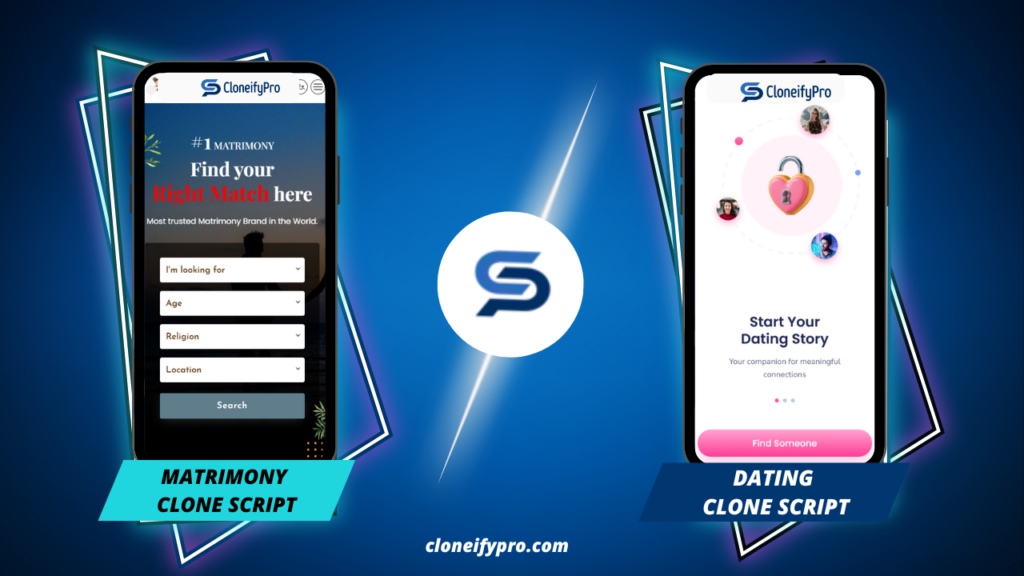Matrimony App vs. Dating App: What’s the Difference?

The search for companionship has changed dramatically in the current digital era, with technology serving as a vital tool for bringing people together. Matrimony apps and dating apps are two of the most well-known platforms among many others. Although they both have the same basic goal of uniting people, their goals, user bases, features, and cultural ramifications are very different. Knowing these differences is essential for companies like CloneifyPro to create products that appeal to their target markets.
1. Purpose and Intent
The primary distinction between a matrimony app and a dating app lies in user intent.
- Matrimony App: Designed for individuals seeking serious, long-term commitments, typically leading to marriage. These apps focus on compatibility, family background, and cultural preferences.
- Dating App: Primarily used for casual relationships, social connections, or short-term engagements. Users explore connections without the immediate pressure of commitment.
2. User Demographics
- Matrimony Apps: Generally, users are adults who are at a stage in life where they are ready to settle down. These apps are widely used in cultures where arranged marriages or family involvement play a crucial role.
- Dating Apps: These apps attract a broader demographic, including teenagers and young adults looking for companionship, casual dating, or friendships.
3. Registration and Profile Verification
Matrimony apps emphasize credibility and authenticity.
- Matrimony Apps: Require detailed registration, including educational background, religion, caste (in some regions), and family details. Many platforms conduct ID verifications and allow family members to be involved.
- Dating Apps: Users typically create profiles with minimal information, such as name, age, location, and interests. Verification is often limited to email or phone number authentication.
4. Matching Algorithm
- Matrimony Apps: Use deep compatibility algorithms based on user preferences, background, and family values. Many apps provide horoscope matching for communities that follow astrological compatibility.
- Dating Apps: Rely on location-based, swipe-to-match, and personality-based algorithms, allowing users to connect based on mutual interests and attraction.
5. Communication Features
- Matrimony Apps: Encourage serious conversations, often allowing direct messaging after mutual acceptance. Some apps facilitate video calls and family interactions before progressing further.
- Dating Apps: Allow instant chat, video calls, and interactive features without stringent restrictions, making interactions more spontaneous.
6. Privacy and Security
Matrimony apps prioritize safety due to the involvement of families and the importance of trust.
- Matrimony Apps: Offer restricted profile viewing, contact number verification, and options to hide personal information until trust is established.
- Dating Apps: Privacy settings vary, with some apps offering features like anonymous browsing, but many allow open profile viewing.
7. Monetization Model
- Matrimony Apps: Follow a subscription-based model, offering premium plans for better matches, increased visibility, and verified profiles.
- Dating Apps: Operate on freemium models with in-app purchases for premium messaging, profile boosts, or ad-free experiences.
8. Cultural and Social Influence
- Matrimony Apps: Deeply rooted in cultural traditions, these apps align with societal norms and expectations, especially in countries like India where arranged marriages are prevalent.
- Dating Apps: More aligned with modern dating culture, promoting independence and social interactions without societal constraints.
9. Development Considerations for Matrimony Apps
If you’re planning Matrimony App Development, here are key features to include:
- Profile Verification: Ensure authenticity through document verification.
- Matchmaking Algorithm: Incorporate AI-driven compatibility scoring.
- Advanced Filters: Allow filtering based on religion, community, education, and profession.
- Privacy Controls: Enable users to manage profile visibility.
- Family Integration: Provide features for family members to participate in the matchmaking process.
- Secure Communication: Offer safe messaging and video call options.
Conclusion
Both matrimony apps and dating apps serve distinct purposes, catering to different user needs. Matrimony apps focus on long-term commitments and cultural compatibility, whereas dating clone script emphasize social interactions and casual relationships. If you’re considering Matrimony App Development, it’s crucial to integrate security, verification, and compatibility-driven features to ensure user trust and engagement.
Whether you’re an entrepreneur looking to launch a matrimony app or a developer exploring matchmaking solutions, understanding these differences will help create a platform that meets user expectations effectively.
